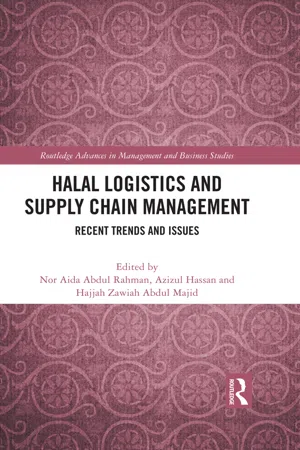Introduction
Halal is a concept linked to Islamic jurisprudence and Islamic Shariah, as Islam is concerned with the extent of Shariah and ethical commercial practices in all its aspects. The perspective of Islamic jurisprudence on commercial transactions is based on confirmation and compatibility with the discipline of the spirit of the law (Shariah) and the principles of transactions in Islamic law through jurisprudential conditioning of contracts of trade, sale, purchase, offer and acceptance. In Islam, trade is considered permissible as long as it is based on trade in what is legitimate and clear and is based on the acceptance and consent of both parties.
Halal logistics is referred to as a basic principle of Halal in logistics to ensure segregation of Halal cargo from non-Halal cargo, to avoid cross-contamination and to ensure that the Halal logistics system is aligned to the expectations of Muslim consumers. Halal logistics is regarded as a new application of Shariah law to logistics activities in a way that will eventually protect Halal integrity along the whole supply chain and follow requirements as stated by Shariah law (Tarmizi et al., 2014; Jaafar et al., 2011; Tieman, 2011).
Most of the literature reviewed focused on a single dimension of Halal practices, such as Halal food, as discussed by Zulfakar et al. (2012). Halal product, Halal consumerism and the issues associated with Halal products dominated the field of Halal studies, while other activities have been neglected (Aziz and Zailani, 2016; Jaafar et al., 2011).
Previous studies on Halal logistics and supply chain are growing significantly as a result of the growth in demand in the Halal market as well as expanding the understanding of Halal from the narrow scope of the Halal product idea to the broader scope of Halal (Talib et al., 2014; Tieman et al., 2012). With the broadening of the scope of the Halal supply chain as a practice, the requirements of the Halal supply chain have increased in terms of the independence of the Halal chain and the activities associated with it, which requires a reconceptualization of the Halal supply chain and its scope, as well as a restructuring of its activities and practices.
In addition, the traditional supply chain environment, with all its components of equipment, facilities, equipment and systems, is not suitable for the Halal supply chain in order to avoid any interaction or confusion between the Halal products and the non-Halal products (Zailani et al., 2017). Compliance with the doctrines of Islamic Shariah goes beyond the stage of confirming the systems and procedures to constructing a system that is built from the ground up as a Halal supply chain system and not just a system that seeks to obtain recognition as a Halal supply chain from Halal bodies. The issue of permissibility is a matter of principle in Islam, given that this is a way of living in Islam, which obliges Muslims to follow everything that is permissible (Halal) and to avoid everything that is forbidden (Haram) because God punishes the forbidden (Talib et al., 2014).
This chapter sheds light on the practices of the supply chain and Halal logistics, as the study tries to cover all Halal logistical practices since previous studies were studying and covering Halal logistics practices separately or according to the purposes of those studies, in addition to reviewing some challenges and some missed practices in the Halal supply chain and logistics. This chapter seeks to achieve theoretical contributions related to Halal practices as contained in the literature on the supply chain and Halal logistics and the rules of the Islamic Shariah that govern Halal practices in business logistics activities. In addition, the study seeks to look at Halal logistical practices holistically in terms of comprehensiveness and conceptual framing. This chapter is structured as follows: discussion of Halal phenomena, theoretical demonstration of Halal literature and Halal logistics practices, presenting the Halal practices in detail, and some concluding thoughts.
Halal literatures
The development of the Halal industry has led to limited growth in the Halal supply chain literature. According to Karia (2019), Halal supply chain and logistics research is still far behind the other areas of research, therefore more studies, research and proof is needed for expanding and supporting the existing theory in the Halal area of research. However, the principles that shape the Halal supply chain remain unclear. Several authors have different interpretations of what makes the supply chain Halal. For example, Tieman et al. (2012) and Tieman and Ghazali (2013) argue that the critical points in the Halal supply chain are during transportation, storage and plant operation. Jaafar et al. (2011) identified Halal supply chains as including purchasing and preparing authentic Halal ingredients to manufacture and deliver the finished product to customer shelves. This includes separating Halal ingredients or non-Halal end products, such as alcoholic products or pork-related products, across the entire chain. Others recommend that similar measures should be taken (Ahmad et al., 2015; Alam and Sayuti, 2011; Ahmad and Shariff, 2016; Tieman, 2011).
Halal can be defined as permissible, legitimate, permitted for consumption, and as a symbol of purity and safety. The opposite of the Halal is Haram, which is the prohibition on eating. As a primary reference for Muslim behaviour, the Holy Quran orders Muslims to consume only Halal products. Not only food, this also includes products such as medicine, cosmetics and many others (Ngah et al., 2015).
The concept of Halal and Toyyiban as “beneficial” as stipulated in Islam includes nutrition, quality, hygiene and safety for all and is not intended only for the Islamic community that can be practised in food production. For example, the Halal certification of food products must cover the source of raw materials for consumers. All the activities along the supply chain (e.g., handling, warehousing and distribution) must be Shariah-compliant as the Toyyiban Halal concept can be applied. No Halal products can be mixed with Haram products, they must be separated from each other (Jaafar et al., 2011).
